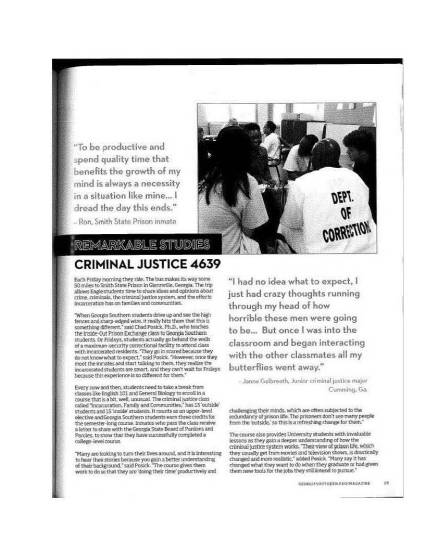I enjoy teaching a variety of courses related to criminology and criminal justice. Being a teacher is very important to me, and I enjoy the opportunity to work with students who will go on to be law enforcement officers, service providers, educators, researchers, and leaders in many other fields all important to our society. Below are my current, and recent, teaching assignments at Georgia Southern University.
Statistics
I teach Statistics for the Social Sciences every Spring. We begin with descriptive and univariate statistics, move on to bivariate and multivariate statistics, and finish with various regression analyses. The course also teaches students how to use R software for analysis.
Inside-Out Spring 2018
I am very happy to offer Inside-Out again in the Spring of 2018. The class for this semester will be called: Race, Place, and the Politics of Punishment. We will focus on issues related to the role of neighborhood characteristics on crime, the political response to problems of crime, and how incarceration shapes individual, community, and national outcomes. Key readings for the course include: Just Mercy by Bryan Stevenson, Ghettoside by Jill Leovy, and Evicted by Matthew Desmond. As always, space is limited to 15 Georgia Southern students. And always, all majors are welcome!
Biosocial Criminology
I am offering a new course on biosocial criminology (I also teach a version of this for First Year Experience). See the information below and email me if you have any questions!

Introduction to Criminal Justice
This is a 3-hour survey course of the criminal justice system and its central components: police, courts, and corrections. Topics include: the activities and legal environment of each component; individual rights and public order; the juvenile justice process; theories of causation; the growth and use of technology in crime and crime solving; and special issues such as AIDS, drugs, and public policy.
Introduction to criminal justice is a very important course that introduces you to issues and concepts in policing, courts, and corrections. Regardless of your career aspirations, knowing about our justice system and current issues in criminal justice are essential for any person in society. At the end of the course you will have a good sense of how individuals are detected and processed by the American criminal justice system as well as understand the difficult issues faced by criminal justice actors such as police officers, judges, and service providers.
Victimology
This course provides an examination of the causes and consequences of victimization. Major emphases are on victimization patterns, risk factors, the victim-offender relationship, the range of injuries experienced by victims, and the role of the victim in criminal justice proceedings.
This course has three main parts. First, we cover issues related to victimization theories, the costs and consequences of victimization, and victim’s rights. Second, we cover different types of victimization and groups of individuals at-risk of victimization. Finally, we conclude the course by looking at programs that have been proven to prevent victimization or address the needs of victims. Victimology is a course that will be useful to all students regardless of career aspiration. Victimization is an important public health issue in which we all can be more knowledgeable and have a part in preventing in society.
Criminal Behavior
This course examines criminal and deviant behaviors from a multidisciplinary approach. It addresses major theories and research, correlates of crime including classification concepts, case studies, and application by components of the criminal justice system.
Criminal behavior is an important area of study for criminologists and criminal justice practitioners and is, therefore, one of the most important courses for undergraduate students in the field. Criminologists and criminal justice practitioners need to have a strong comprehension of both historic and modern theories of behavior in order to understand the rational for the policies and programs that are currently utilized by the organizations that employ them. A strong understanding of the concepts covered in this course will help students not only excel within the systems in which they work, but give them a basis for improving those systems.
Inside-Out – Incarceration, Crime, and Communities
Inside-out is a program (see more here: http://www.insideoutcenter.org/programs.html) that brings together university students and prisoners to take part in a academic class that meets inside the prison. The topic of the class varies depending on the professor teaching the course and the location of the class. I focus my class on three main issues: 1) incarceration laws and policies; 2) the effect of incarceration on individuals, families, and communities; and 3) alternatives to incarceration and current incarceration policies. Our department rotates the class topic and faculty teaching the course, so if you are interested in the future, please get in touch with me or someone in the department. If you are specifically interested in my class, feel free to contact me any time. The class that was conducted this past Fall (2014) was excellent and all students indicated that it was a life changing experience. It was for me too!

Crime, Media, and Pop-Culture
This summer, again, I will be teaching a class on crime and the media. I will be using a book on the show The Wire. The Wire does an excellent job in portraying several issues related to crime and justice. Additionally, I will bring in other material on a variety of topics ranging from how the media depicts terrorism to the CSI effect on jurors. I am particularly excited to discuss recent issues related to police-community relations and the use of rap lyrics in court cases. This is a graduate-level class, but it is open to all students in grad programs around the university.
